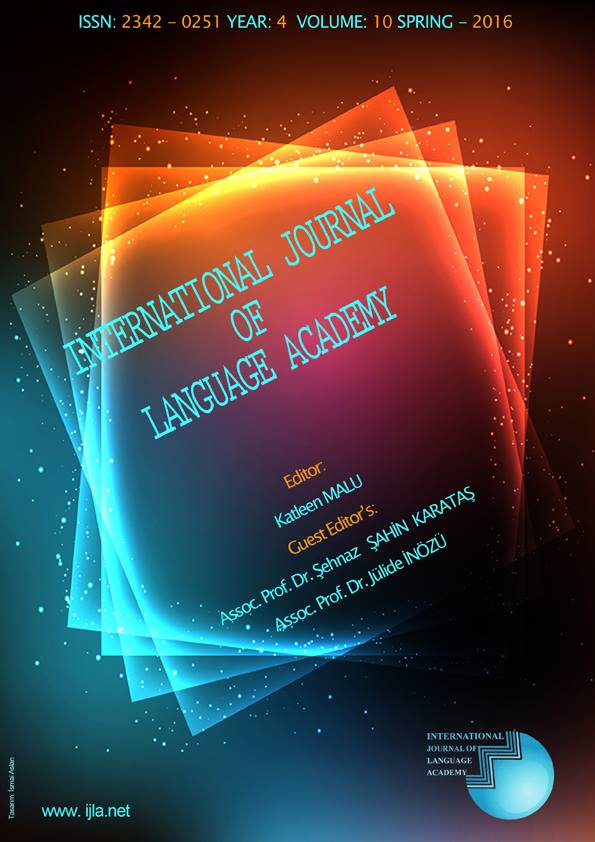Author :
Abstract
Etkili dil öğretmeni olgusu, “etkili” kelimesinin çeşitli araştırmacıların yanı sıra belirli bağlamlara göre de farklı yorumlanmasından dolayı en tartışmalı konular arasında yer almaktadır. Önceleri bu olgu, yalnızca öğrencilerin başarısını sağlama ya da hedef dile iyi bir biçimde hakim olma olarak düşünülüyordu. Fakat, Çelik, Arıkan ve Caner (2013)’in de belirttiği gibi öğrenciler artık etkili dil öğretmeninin özellikleri ile ilgili olarak farklı algılar ve beklentiler içerisindedir. Bu varsayımdan hareketle, mevcut çalışma aynı sınıfta fakat başarı seviyeleri, katılım ve derse devam açısından tamamen iki farklı uçta bulunan iki öğrencinin etkili İngilizce öğretmeni olgusu üzerine kişisel teorilerini keşfetmeyi amaçlamaktadır. Veriler, Repertuar çizelgesi tekniği (Rep-Grid) ve deneklerin algılarının daha iyi anlaşılmasını sağlamak amacıyla takip eden bir görüşme yoluyla toplanmıştır. Deneklerin kişisel teorileri, başarılı bir öğrencinin etkili bir İngilizce öğretmenini ağırlıklı olarak pedagojik alan bilgisine sahip biri olarak düşündüğünü gösterirken, “başarısız” öğrencinin ise daha çok öğretmenlerin sınıf davranışları ile ilgili olduğunu göstermiştir.
Keywords
Abstract
The phenomenon of effective language teacher has become among the most controversial topics because of the interpretational variations of the word “effective” with respect to particular contexts as well as scholars. It used to be acknowledged as simply ensuring learners’ achievement or as having a good command of the target language. However, Çelik, Arıkan, and Caner (2013) suggest that students now hold different perceptions and expectations with respect to the characteristics of an effective foreign language teacher. Based on this assumption, the present study aims to explore the personal theories of two classmates at two extremes in terms of their achievement, participation, and attendance to classes on effective English language teacher. Data have been collected through Repertory Grid Technique (Rep-Grid) and with a follow-up interview in order to clarify the subjects’ perceptions. Personal theories of the subjects demonstrate that the successful student characterizes an effective English teacher as someone having predominantly pedagogical content knowledge whereas the unsuccessful student is more concerned with classroom behavior of teachers.
Keywords
- Arıkan, A., Taşer, D., & Saraç-Süzer, H. S. (2008). The effective English language teacher from the perspectives of Turkish preparatory school students. Education and Science, 33(150), 42-51.
- Borg, S. (2006). The distinctive characteristics of foreign language teachers. Language Teaching Research, 10(1), 3-31.
- Curtis, A. M., Lowry, P. B., Wells, T. M., & Higbee, T. (2008). An Overview and Tutorial of the Repertory Grid Technique in Information Systems Research. Communications of the Associations for Information Systems 23 (3), 37-62.
- Çelik S., Arıkan A., & Caner M. (2013). In The Eyes Of Turkish Efl Learners: What Makes An Effective Foreign Language Teacher?. PORTA LINGUARUM, vol.20, pp.287-297.
- Dinçer,A., Göksu, A., Takkaç, A. & Yazıcı, M. (2013). Common characteristics of an effective English language teacher. The International Journal of Educational Researchers, 4(3), 1-8.
- Frankell, J. R., Wallen, N. E., & Hyun, H. H. (2012). How to design and evaluate research in education. New York: McGraw Hill.
- İlin, G. (2003). A model for effective supervision from the supervisor and the student- teachers’ perspective: a social constructivist approach. Doctoral dissertation, The Institute of Social Sciences, Çukurova University.
- Kelly, G. A. (2003). A brief introduction to personal construct theory.
- Lupascu, A.R., Pânisoara, G., & Pânisoara, I. O. (2014). Characteristics of effective teachers. Procedia-Social and Behavioral Sciences 127, 534-538.
- Minor, L. C., Onwuegbuzie, A. J., Witcher, A. E. & James, T. L. (2002). Preservice teachers’ educational beliefs and their perceptions of characteristics of effective teachers. Journal of Educational Research, 96(2), 116-127.
- Richards, J. C. (1990). The dilemma of teacher education in second language teaching. In J.C. Richards & D. Nunan (Eds.), Second Language Teacher Education (pp. 3-15). New York, USA: Cambridge University Press.
- Rubio, C. M. (2009). Effective teachers –Professional and personal skills. en ENSAYOS, Revista de la Facultad de Educación de Albacete, Nº 24, 35-46.
- Shulman, L. (1987) Knowledge and teaching: Foundations of the new reform. Harvard Educational Review, 57(1), 1-22.
- Şaşan, H. H. (2002). Yapılandırmacı öğrenme. Yaşadıkça Eğitim 74-75, 49-52.
- Wallace, M. J. (1991). Training foreign language teachers: A reflective approach. New York: Cambridge University Press.





